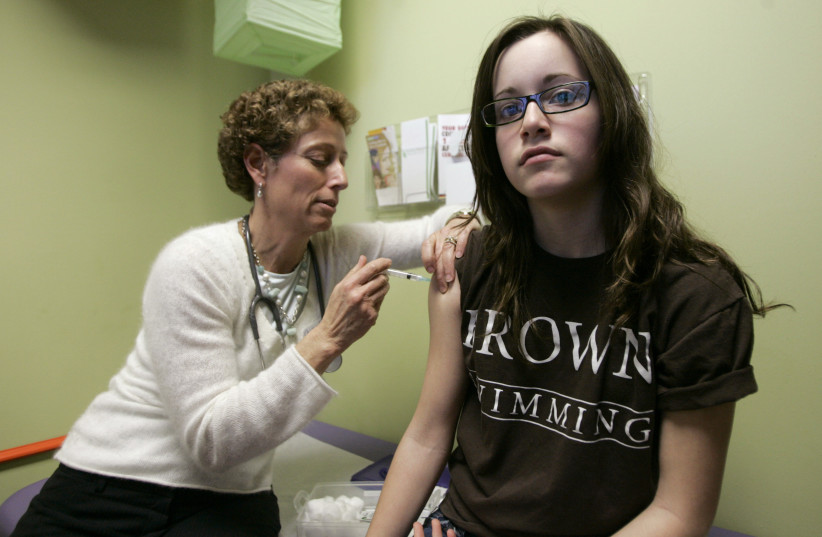 One HPV shot may be enough to prevent cancer-provoking infection – study
One HPV shot may be enough to prevent cancer-provoking infection – study
JERUSALEM POST STAFF
A study published in the medical journal JAMA Network Open on Friday has analyzed the situation in the US a little over a decade after the vaccine against HPV was introduced.

Receiving one dose of the human papillomavirus (HPV) vaccine might be as effective as receiving two or three HPV shots, a new study has suggested.
As explained by Encyclopedia Britannica, HPV refers to a subgroup of viruses that infect humans and in some cases can cause warts (papillomas) and other benign tumors as well as cancers of the genital tract, especially of the uterine cervix in women – more than 90% of women diagnosed with this type of cancer are found infected with one of the viruses. The viruses can spread through sexual contact.
A study published in the medical journal JAMA Network Open on Friday has analyzed the situation in the US a little over a decade after the vaccine against HPV was introduced.
According to the study, about 51% of the adolescents in the US have completed the series of vaccines, while about 68% have received at least one dosage – the gap being caused by reasons including unawareness of the need of receiving the vaccine more than once, forgetfulness and lack of insurance coverage.
1,620 women were sampled in the study, of whom 1004 were unvaccinated and 616 received at least one dose of the HPV vaccine. Of those, 106 received one dose, 126 received two doses, and 384 received three doses.
Among those who received at least one shot, the researchers found no significant difference in terms of the effectiveness of the protection.
“HPV vaccine coverage is less than 10% globally because of poor vaccine uptake rates in many resource-limited countries. Ensuring boys and girls receive their first dose is a big challenge in several countries and a majority of adolescents are not able to complete the recommended series due to a lack of intensive infrastructure needed to administer two or three doses,” Ashish Deshmukh, the study’s senior author and an assistant professor at the University of Texas Health Science Center at Houston’s School of Public, said in a press release, as quoted by CNN.
“If ongoing clinical trials provide evidence regarding sustained benefits of a one-dose regimen, then implications of single-dose strategy could be substantial for reducing the burden of these cancers globally,” he added.
Zawartość publikowanych artykułów i materiałów nie reprezentuje poglądów ani opinii Reunion’68,
ani też webmastera Blogu Reunion’68, chyba ze jest to wyraźnie zaznaczone.
Twoje uwagi, linki, własne artykuły lub wiadomości prześlij na adres:
webmaster@reunion68.com
